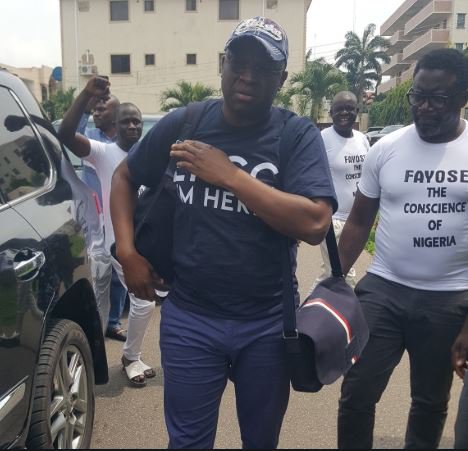There are no products in your shopping cart.
| 0 Items | £0.00 |

 ECONOMIC and Financial Crimes Commission (EFCC) officials have obtained a remand order from a Federal Capital Territory (FCT) high court to detail former Ekiti State governor Ayo Fayose for two weeks as they question him over corruption charges.
ECONOMIC and Financial Crimes Commission (EFCC) officials have obtained a remand order from a Federal Capital Territory (FCT) high court to detail former Ekiti State governor Ayo Fayose for two weeks as they question him over corruption charges.
On Tuesday, Governor Fayose submitted himself to the EFCC following the end of his tenure and the lapsing of his immunity from prosecution. Turning up at the commission's offices in Abuja wearing a T-shirt with the inscription EFCC I'm Here, Governor Fayose said he is ready to answer any questions about his stewardship.
Since his detention, Governor Fayose has denied any involvement in the $1.3bn scam in which former defence minister Senator Musiliu Obanikoro handed him cash to prosecute the 2014 Ekiti gubernatorial elections. Eager to get more out of him, the EFCC applied for court permission to detain him and it is believed that the remand order is subject to renewal, which implies that Governor Fayose could spend longer than two weeks in custody.
One EFCC source said: “We have obtained a court order to hold Fayose for at least two weeks pending investigation. He could be released earlier or later than two weeks depending on the outcome of investigation.
"We have many cases against Fayose being handled by three different teams. We cannot just arraign him immediately as we want to do a thorough job before taking him to court.”
In addition to the $1.3bn scam, Governor Fayose is also being probed for allegedly receiving kickbacks from government contractors through his aide, Abiodun Agbele, who is currently standing trial for fraud. However, Chief Mike Ozekhome, Governor Fayose's lawyer, said that if the EFCC failed to release him today, the commission would be sued for breaching his fundamental human rights.
According to Chief Ozekhome, the EFCC began investigating Governor Fayose over two years ago and he wondered why the agency would decide to hold him for over 24 hours. He added that the commission could not force Governor Fayose to write any statement as he reserved the right to remain silent.
Chief Ozekhome added: “His lawyers will consider approaching the court for the enforcement of his fundamental human rights if he is not released on Thursday. Section 35 and 36 of the constitution are clear on this. He is not a flight risk, he willingly submitted himself to the EFCC even earlier than the time he was supposed to come, so what the EFCC is doing is nothing but media trial.
“From the way they have been chasing Fayose in the last three years, one would have expected that the EFCC would have completed its investigations and would arrest him immediately his tenure expires and charge him the next day but that is not the case. They want him to write a statement by force and then use the statement against him instead of using their own evidence.”
Lere Olayinka, Governor Fayose's spokesman, called on the EFCC to stop acting irresponsibly by subjecting Nigerians to media trial whenever they lacked concrete evidence to sustain a court case. He added that the commission has started its usual lies by claiming that it discovered houses bought by Fayose with public funds.
Mr Olayinka said: “Nigerians should recall that in 2016, operatives of this same EFCC attempted to seal up a guest house located at Gana Street, Maitama, Abuja, claiming that it belonged to Fayose. Whereas, the building belonged to a retired army general.”
It is believed that Governor Fayose lose at least six choice assets if a court agrees with the EFCC as the commission has applied for the permanent forfeiture of the assets in Lagos and Abuja. According to one source, the EFCC may approach the court for the permanent confiscation of the six properties to recover the sums of N1.3bn and $5.377m allegedly collected by the ex-governor.